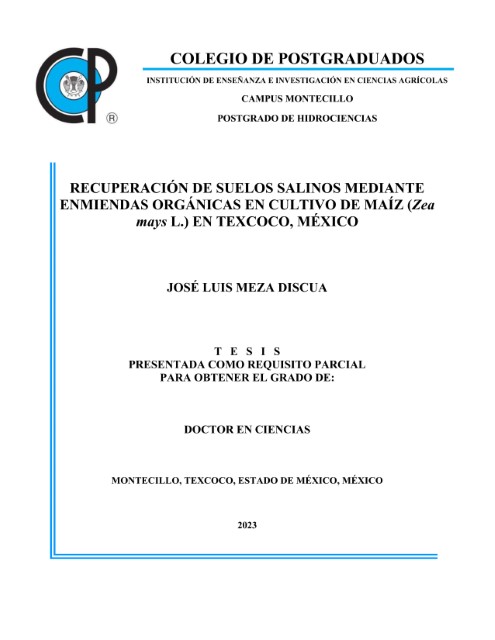
Fecha: 2023-08
Estudiante: JOSÉ LUIS MEZA DISCUA
DOCTORADO EN CIENCIAS - HIDROCIENCIAS
JOSÉ LUIS MEZA DISCUA, D. C. Colegio de Postgraduados, 2023/08
RESUMEN
La salinidad en los suelos es un factor abiótico que limita el rendimiento de
los cultivos al restringir la absorción de agua y nutrientes en la planta. El
objetivo del estudio fue evaluar el efecto de enmiendas orgánicas en varias
propiedades químicas de suelos salinos y en el rendimiento de cultivo de maíz (Zea
mays L.), cultivar CP-HS2, en agricultura de secano en suelo lacustre, Solonchak
del valle de Texcoco, México. El experimento se realizó en el ciclo
primavera-verano de 2021 en las siguientes coordenadas: longitud -98.907222 y
latitud: 19.455000, altitud 2220 m, la precipitación del periodo del estudio fue
506 milímetros. El diseño experimental fue de bloques completos al azar, con
tres repeticiones. Los factores de variación fueron salinidad en tres niveles
(alta 8.4, media 5.3 y baja 2.7 dS m respectivamente), enmiendas usadas (vermicomposta,
biochar y composta de vacuno), y las dosis de 5 y 10 t ha -1, más un testigo
(control) sin enmienda. Las unidades experimentales fueron en de 8 × 3,75 m con
seis hileras separadas 0,80 m. Se realizaron muestreos del suelo antes y al
final del cultivo y se determinó CE, pH, y M.O y RAS. Además, de realizaron
muestro para evaluar el rendimiento de grano. Los resultados indicaron que con
el biochar aplicado en suelos de alta salinidad, el rendimiento fue de 4.63 t ha
-1, la CE se redujo en un 93 %, el pH se redujo de 9,9 a 8,3 y la MO aumentó en
un 119 %. En suelos con salinidad media aplicando composta de vacuno el
rendimiento fue 4,67 t ha -1, la CE se redujo 88%, el pH disminuyó de 9,1 a 8,3
y la MO aumentó 160%. En suelos de baja salinidad aplicando composta de vacuno
el rendimiento fue de 4,6 t ha -1, la CE se redujo en 44%, el pH se redujo a 8,1
y la MO aumentó en 121%. El estudio demostró los beneficios de las enmiendas
orgánicas para la recuperación de los suelos salinos.
Palabras claves: Salinidad, conductividad eléctrica, materia orgánica,
tolerancia, rendimiento.
RECOVERY OF SALINE SOILS THROUGH ORGANIC AMENDMENTS FOR CORN (Zea mays L.) CULTIVATION IN TEXCOCO, MEXICO
JOSE LUIS MEZA DISCUA, D. C. Colegio de Postgraduados, 2023/08
ABSTRACT
Soil salinity is an abiotic factor that limits crop yield by restricting
plant uptake of water and nutrients. The objective of the study was to
evaluate the effect of organic amendments on various chemical properties
of saline soils and on the yield of maize (Zea mays L.), cultivar CPHS2,
in rainfed agriculture in lacustrine soil, Solonchak from the Texcoco
valley, Mexico. The experimental site was carried out in the spring-summer
cycle of 2021 and was located at the coordinates: longitude -98.907222
and latitude: 19.455000, altitude 2220 m, the precipitation of the
period was 506 millimeters. The experimental design was a randomized
complete block, with three repetitions. The variation factors were
salinity at three levels (high 8.4, medium 5.3 and low 2.7 dS/m
respectively), amendments (vermicompost, biochar and bovine compost),
and the doses of 5 and 10 t/ha, plus a control without amendment. The
experimental units were 8 × 3.75 m with six rows separated by 0.80 m.
Soil samples were taken before and at the end of the crop and EC, pH,
and OM and RAS were determined. The method of corn components determined
the grain yield. The results indicated that with the biochar applied in
high salinity soils, the yield was 4.63 t/ha, the EC was reduced by 93%,
the pH improved (from 9.9 to 8.3) and the OM increased by 119%. In soils
with medium salinity, when applying cattle compost, the yield was 4.67
t/ha, the EC was reduced by 88%, the pH improved (from 9.1 to 8.3) and
the OM increased by 160%. In low salinity soils, when applying cattle
compost, the yield was 4.6 t/ha, the EC was reduced by 44%, the pH
improved to 8.1 and the OM increased by 121%. The study demonstrated the
benefits of organic amendments for the recovery of saline soils.
Keywords: Salinity, organic amendments, organic matter, tolerance, yield.